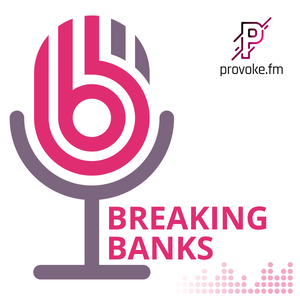
Breaking Banks
Breaking Banks - The #1 Global Fintech Podcast
The #1 global fintech radio show and podcast. Every week we explore the personalities, startups, innovators, and industry players driving disruption in financial services; from Incumbents to unicorns, and from the latest cutting edge technology to the peo
- 31 minutes 41 secondsBanking Innovation: Journey and Insights from an Incumbent Bank
In This Episode
Getting digital right can be challenging for anyone –small banks, big banks, incumbents, challengers, you name it.
In this episode, Brett King meets up with Akbank’s Consumer Banking & Digital Solutions, EVP, Burcu Civelek Yuce to talk about Akbank and Akbank LAB, Akbank’s Innovation Lab. The discussion focuses on the incumbent bank ‘s digital engagement and excellence in collaborating and partnering with fintechs and big tech.
Turkey is the 18th largest country in the world in terms of population size, with Akbank one of the largest banks (77 years young) in Turkey. Akbank has nimbly undergone a smoothe digital transformation with the majority of its customers now coming through digital channels — be it new customer acquisition, servicing or sales.
Akbank LAB is the innovation center that coordinates Akbank’s pioneering fintech developments. Here, they study best working models and implement solutions to make the lives of Akbank’s customers easier. Fintech partnership and collaboration are key components of Akbank LAB’s success, with partners working hard to create value for their customers.
Akbank is embracing AI with Banking IQ, hyper personalized information on customers, and is actively reskilling employees to lead the way forward.
Listen to this engaging conversation to learn best practices relevant for all banks and financial institutions.
For further information: akbanklab.com or [email protected]
https://www.youtube.com/watch?v=3SbBhLVNvlQ23 January 2025, 8:00 am - 32 minutes 37 secondsSuze Orman | Rethinking How People Save
In This Episode
What’s the key to financial security today? As technology and a shifting economy reshape how we save, spend, borrow, and plan for the future, mastering the art of money management is critical for achieving financial health. Listen as Jennifer Tescher, host of sister podcast Emerge Everywhere and Founder of the Financial Health Network, speaks with Suze Orman – personal finance expert, author, Emmy Award winner, and Co-Founder of workplace emergency savings platform SecureSave – about the critical role of savings and an important step companies can take to support employees’ financial success today.
Dedicated to improving financial health for all, especially the most vulnerable among us, Emerge Everywhere tackles the complex issues intersecting the financial well-being of people across America while exploring how to build an inclusive economy.
Listen now!
16 January 2025, 5:07 pm - 49 minutes 25 secondsWill 2025 Be A Stellar Year? Top Banking and Fintech Predictions
In This Episode
2024 is a wrap! Listen as industry leaders and fintech influencers share insights on the year that was before turning the lens forward to 2025. What will be hot in this new year?
Back by popular demand, Breaking Banks hosts Brett King and JP Nicols assemble banking industry leaders and fintech influencers to get their takes and predictions on what 2025 has in store for the banking industry.
Joining the discussion are Jim Marous (The Financial Brand, Banking Transformed), Ron Shevlin (Chief Research Officer, Cornerstone Advisors and Forbes Contributor), and Mary Wisniewski (Cornerstone Advisors, Money Isn’t Everything). Together, they explore critical topics shaping the industry, from fraud, risk, and efficiency to cutting-edge innovations like Agentic AI and LLMs, as well as developments in open banking, 1033, and the CFPB.
And what about the lingering impact of the Synapse story from 2024? Will 2025 bring a reckoning, or are brighter days ahead for the industry? Tune in for a lively and engaging conversation packed with expert insights and bold predictions.
Happy New Year from the team at Breaking Banks
https://www.youtube.com/watch?v=yahPylU7TCw9 January 2025, 5:49 pm - 1 hour 6 minutesTrust, Value & What It Means To Be Digital in Banking
In This Episode
Regular listeners of Breaking Banks are likely familiar with the Killing It series, hosted by Jason Henrichs and Alex Johnson, where they explore candid stories of success, failure, and the pivotal and sometimes tough decisions that drive the journey from VCs to unicorns in the high stakes world of entrepreneurship. (If you’re not, check it out!)
In this episode, Brett King shifts gears with a “Starting It” theme, sitting down with industry veteran Anthony Thomson —an entrepreneur, marketer, speaker, author, and founder of Metro Bank, Atom, and 86 400. Metro Bank challenged traditional banking in the UK, while Atom and 86 400 brought innovation as neo-banks in different markets, with 86 400 later acquired by NAB (National Australia Bank) and then merged into UBank.
Join this enlightening discussion as Brett and Anthony dive into the unique missions and lessons behind each of these groundbreaking ventures. And who knows? You might even get a sneak peek at the next big breakthrough in the industry!
Read the entire transcript here.
Podcast Content:
Chapter 1: (00:00) – Introduction and Setting the Scene
Brett King and Jason Henricks open the episode, reflecting on their history of exploring financial disruption. Special guest Anthony Thompson joins from Abu Dhabi, sharing memories of past debates on the future of banking.
Chapter 2: (03:45) – The Genesis of Metro Bank
Anthony recounts his journey from marketing in financial services to founding Metro Bank. The discussion highlights how Metro Bank disrupted traditional banking by focusing on customer-centric value and trust.
Chapter 3: (12:30) – Cognitive vs. Associative Trust in Banking
The hosts and guest delve into the dual dimensions of trust: competence versus intent. Anthony explains how Metro Bank leveraged customer-centric policies, like dog-friendly branches, to foster associative trust.
Chapter 4: (20:15) – The Shift to Digital Banking
Anthony reflects on the rise of digital banking, including his transition to founding Atom Bank. The conversation examines how mobile banking became the cornerstone of modern financial services.
Chapter 5: (28:50) – Building Atom Bank
The discussion explores Atom Bank’s founding principles, focusing on delivering a superior mobile experience and balancing liabilities with assets. Anthony contrasts Atom’s approach with competitors like Monzo and Starling.
Chapter 6: (40:00) – Lessons Learned and 86 400
Anthony describes his move to Australia to establish 86 400. He shares how lessons from Atom influenced his strategy, particularly the importance of engagement and transaction accounts.
Chapter 7: (51:30) – Challenges in Traditional Banking Transformation
The conversation shifts to why traditional banks struggle with digital transformation. Anthony and Brett critique cultural and regulatory hurdles faced by legacy institutions.
Chapter 8: (58:10) – The Role of Regulators in a Digital World
Anthony discusses how regulators worldwide are adapting to digital banking innovations, emphasizing the importance of competition and better consumer outcomes.
Chapter 9: (1:06:20) – Reflections and Future of Banking
Anthony shares his hopes for the future of banking, emphasizing customer-centricity as the industry’s ultimate goal. Brett and Anthony speculate on the next breakthrough, pointing to adjacencies and AI in banking.
Chapter 10: (1:12:50) – Closing Thoughts and Takeaways
The hosts summarize the key themes of the episode, including trust, customer value, and the evolution of banking. They close with a call to action for listeners to engage with the podcast and its community.
Related Content:
19 December 2024, 2:30 pm - 40 minutes 18 secondsReimagining Digital Banking: Varo Bank’s Vision for Financial Inclusion
This week, host Brett King sits down with Colin Walsh, Founder and CEO of Varo Bank, to explore the journey of building the first all-digital, FDIC-insured de novo bank in U.S. history. Designed to improve financial health and serve a diverse range of customers—from those with financial abundance to those facing economic hardship—Varo Bank is on a mission to create a banking experience that truly works for everyone.
With the unique distinction of being the first consumer fintech to be granted a bank charter in US history, Varo is redefining banking with innovative products tailored to modern consumers’ needs. From managing fraud and credit risk to building trust and leveraging a cutting-edge tech stack, they delve into the strategies that power Varo’s ability to stay agile and customer-focused. Whether it’s delivering accessible savings and lending solutions or tackling the challenges of financial inclusion, Varo Bank’s story is one of innovation and impact.
Tune in for a wide-ranging discussion on how Varo is using digital banking to create financial inclusion by addressing the real financial challenges that Americans face every day.
Read the entire transcript here.
Podcast Content:
Chapter 1: (00:00) – Introduction and Varo Bank’s Unique Path
Brett King introduces the episode and welcomes Colin Walsh, founder and CEO of Varo Bank, to discuss their journey as the first pure-play digital bank with a de novo charter.
Chapter 2: (04:15) – Navigating Industry Challenges
Colin reflects on the pandemic’s impact, funding market changes, and navigating regulatory challenges while focusing on profitability and customer-centric innovation.
Chapter 3: (10:45) – The De Novo Advantage
A discussion on Varo’s strategic decision to pursue a de novo national bank charter, contrasting it with fintech sponsorship models and highlighting its benefits.
Chapter 4: (16:30) – Building a Competitive Tech Stack
Colin details Varo’s proprietary technology investments, including AI, machine learning, and the migration to React Native, ensuring agility and innovation in product offerings.
Chapter 5: (24:50) – Lending Innovation and Financial Inclusion
Varo’s approach to cash-flow-based lending and leveraging technology to responsibly serve non-prime, paycheck-to-paycheck consumers is explored in depth.
Chapter 6: (32:10) – Tackling Fraud with Technology
The team discusses how Varo combats sophisticated fraud through advanced tech and the advantages of being a technology-first bank in risk management.
Chapter 7: (37:40) – Scaling with Discipline
A look at Varo’s approach to disciplined customer acquisition, organic growth, and creating high lifetime value customers through deep engagement.
Chapter 8: (44:00) – The Future of Financial Inclusion
Colin explains Varo’s mission to become a financial operating system for underserved Americans and discusses innovations like embedded financial tools.
Chapter 9: (50:30) – IPO Plans and Market Consolidation
The conversation shifts to Varo’s long-term goals, including profitability milestones, potential IPO timelines, and strategic opportunities in a consolidating market.
Chapter 10: (58:15) – Looking Ahead
Colin previews upcoming initiatives, including a new app launch and partnerships, and emphasizes Varo’s role in addressing financial stress for customers.
Related Content:
https://www.youtube.com/watch?v=1lIqYB3d4IY12 December 2024, 2:43 pm - 35 minutes 19 secondsA Digital Banking Revolution in SEA: GXBank and Mastercard
In This Episode
Southeast Asia’s fintech revolution is here, and GXBank is leading the charge. From its roots as a ride-hailing service to becoming Malaysia’s first digital bank, GXBank is transforming how Malaysians access and manage their money.
This week on Breaking Banks, host Brett King sat down with GXBank’s Chief Commercial Officer, Kaushik Chowdhury, and Mastercard’s Senior Vice President & Country Manager for Malaysia and Brunei, Beena Pothen. They discuss the incredible journey of GXBank, the partnership with Mastercard, and how the bank is reshaping financial inclusion in Southeast Asia.
GXBank, a subsidiary of GXS Bank Pte. Ltd. (a joint venture between Grab and Singtel), officially launched operations September 1, 2023, introducing its app two months later. In a year, the bank has amassed over 750,000 customers, offering innovative and personalized solutions to support financial resilience and inclusion. Learn how GXBank is making banking accessible to all Malaysians while setting a new standard for digital banking in the region.
Discover how Mastercard’s cutting-edge technologies and deep fintech expertise are empowering GXBank to deliver smarter, more inclusive financial solutions. As fintechs look to build, launch, and grow their business, Mastercard is helping to drive smarter decisions for better outcomes through strong partnerships across the payments ecosystem.
Resources:
Learn more about GXBank: gxbank.my
Explore how Mastercard supports fintech innovation: Mastercard Fintech ServicesRead the entire transcript here.
Podcast Content:
Chapter 1: 00:00 – Welcome and Introduction
Brett King introduces the episode, focusing on digital banking trends in Southeast Asia with GXBank and Mastercard as key players.
Chapter 2: 03:30 – GXBank: Building a Digital Bank from Scratch
Kaushik Chowdhury discusses GXBank’s journey, from user research to creating a mobile-first digital bank in Malaysia.
Chapter 3: 10:15 – The Evolution of Banking in Southeast Asia
Bina Pothan highlights the rapid adoption of digital banking in Southeast Asia, driven by smartphones, internet access, and changing consumer expectations.
Chapter 4: 18:00 – Financial Inclusion through Digital Innovation
Exploring how GXBank and Mastercard aim to serve underserved and financially vulnerable populations across Malaysia and the region.
Chapter 5: 26:30 – Leveraging Partnerships for Success
Insights into GXBank’s partnership with Mastercard, enabling rapid launches and delivering impactful financial products to consumers.
Chapter 6: 34:45 – Payments Innovation and Embedded Finance
Examining GXBank’s focus on payment solutions, including QR systems, debit cards, and embedded banking experiences with Grab.
Chapter 7: 42:00 – Overcoming Challenges in Digital Banking
Kaushik discusses the challenges of building a digital bank, including hiring, partnerships, and balancing innovation with trust and security.
Chapter 8: 50:15 – Future Plans and Scaling Ambitions
GXBank outlines its roadmap, aiming for profitability and becoming a top bank in Malaysia by leveraging its ecosystem and customer-centric strategies.
Chapter 9: 57:30 – Key Takeaways and Final Reflections
Bina and Kaushik emphasize trust, utility, and collaboration as essential elements for succeeding in the digital banking revolution.
Related Content:
- Fintech Visionaries and Revolutionaries & What’s Up With Bitcoin?
- Bank-Fintech Partnerships, Open Banking and AI…oh my!
- Huawei Does Gen-Fi
- Shopify Finance: Fueling Merchant and Small Business Growth
- Episode 558: Fintech Visionaries Reimagining the Future of Finance: Start Path
Recorded end of September
7 December 2024, 4:40 pm - 52 minutes 7 secondsDecentralized AI & Financial Inclusion
In This Episode
Good leaders drive day-to-day results. Great leaders share visionary ideas and then inspire organizations and stakeholders to find a way to get there. In today’s second segment, Jennifer Tescher, host of sister podcast Emerge Everywhere, introduces this year’s Financial Health Visionary Award honoree, Brian Moynihan, Chair and CEO of Bank of America. The Visionary Award recognizes those who have shown unparalleled leadership in building a more inclusive financial system and empowering the next generation of leaders to innovate solutions that improve financial health for all. Listen to hear about Brian’s commitment to financial health and the upcoming headwinds and tailwinds impacting customers’ financial health.
But first, bestselling author Michael J Casey, the chairman of DAIS (Decentralized AI Society), senior advisor on MIT Media Lab’s Digital Currency initiative, and previous Chair of Consensus at CoinDesk, joins Brett to talk about the reality of decentralized and open source AI. The intersection of DeFi and DeAI appears to be a logical path if not for the hundreds of billions being invested in big tech efforts to create AGI. Is it possible to really make AI less centralized and still deliver the promise of a highly automated world? You’ll need to tune in to find out!
Read the entire transcript here.
Podcast Content:
Chapter 1: 00:00 – Welcome and Introduction
Brett King introduces Michael J. Casey, discussing his transition from Coindesk to leading decentralized AI initiatives at DAIS.
Chapter 2: 03:45 – The Concept of Decentralized AI
Michael explains the importance of decentralizing AI to avoid monopolies and to democratize access to AI-driven innovations.
Chapter 3: 12:30 – Challenges and Innovations in Decentralized AI
Exploring technical and economic challenges in implementing decentralized AI, including blockchain integration and distributed computing.
Chapter 4: 22:00 – Data Ownership and Privacy in Decentralized Systems
The shift from data privacy to data ownership, with blockchain providing traceability and ensuring compliance in AI applications.
Chapter 5: 30:15 – Financial Inclusion through Decentralized AI
How decentralized AI can drive financial inclusion, especially for underbanked communities, by creating fairer access to financial tools.
Chapter 6: 38:45 – Open Health Data and Decentralized Models
A comparison between open banking and the potential for open health data, emphasizing secure, decentralized systems for sensitive data.
Chapter 7: 46:15 – The Future of Decentralized AI in Financial Systems
Michael and Brett discuss the long-term potential of decentralized AI to reshape financial services, creating smarter and more inclusive systems.
Chapter 8: 54:00 – Reflections on Michael’s Book: “Our Biggest Fight”
Insights from Michael’s book on reclaiming digital autonomy, setting the stage for the critical role of decentralized AI.
Related Content:
https://www.youtube.com/watch?v=-QSByxCEUbA27 November 2024, 8:00 am - 52 minutes 4 secondsHuawei Does Gen-Fi
This week on Breaking Banks, host Brett King takes us to Shanghai for a riveting discussion with Jason Cao, CEO of Huawei’s Global Financial Services competency. In this eye-opening episode, they uncover how China is shaping the future with AI—not as a mere tool for profit, but as core infrastructure driving the world’s fastest-growing economy.
Discover why GenFi LLMs (Generational Financial Language Models) don’t exist yet—and what’s holding AI like ChatGPT back from transforming banking as we know it. Explore how China’s unique approach to technology infrastructure is setting them apart from the rest, helping them to create a Smart Economy of the Future.
Tune in for a conversation that could redefine the future of global finance and AI!
Read the entire transcript here.
Podcast Content:
Chapter 1: 00:00 – Welcome and Introduction
Brett King and Jason Henricks introduce the episode, recorded in Shanghai, featuring Huawei’s Jason Tsao discussing fintech innovations.
Chapter 2: 03:30 – Global Fintech Highlights: NewBank and Beyond
Exploring global fintech trends, including NewBank’s growth and the technological strides of digital-first banks like WeBank.
Chapter 3: 10:45 – Huawei’s Vision for Smarter Finance
Jason Tsao shares insights into Huawei’s initiatives in digital finance, AI integration, and the transformation of customer experience in banking.
Chapter 4: 20:00 – Resilience in Financial Infrastructure
A discussion on the critical need for resilience in banking systems, addressing latency, zero downtime, and advanced fraud prevention technologies.
Chapter 5: 30:15 – AI-Driven Banking and Generative Finance
Exploring how Huawei collaborates with banks to leverage generative AI for efficiency, value creation, and customer-centric innovations.
Chapter 6: 40:00 – Digital Infrastructure in China: A Global Example
Highlighting China’s advancements in digital payments, infrastructure, and regulatory approaches that drive a highly digital economy.
Chapter 7: 50:30 – Cloud Strategies for Financial Institutions
Examining the rise of hybrid cloud strategies and the pivotal role of cloud computing in transforming banking operations.
Chapter 8: 59:00 – The Future of Autonomous Finance
How AI and automation are shaping the next generation of financial services, inspired by China’s digital transformation.
Chapter 9: 65:00 – Invitation to Explore the Future in China
Jason Tsao extends an invitation to global audiences to witness the rapid technological advancements in Shenzhen and across China.
Related Content:
- Bank-Fintech Partnerships, Open Banking and AI…oh my!
- Shopify Finance: Fueling Merchant and Small Business Growth
- Fintech Visionaries and Revolutionaries & What’s Up With Bitcoin?
- Episode 189: Disruption Stories: Generative AI for Investments
- Episode 405: Driving Change Through Talent and Infrastructure
21 November 2024, 8:00 am - 33 minutes 14 secondsFintech Visionaries and Revolutionaries & What’s Up With Bitcoin?
In This Episode
Strong partnerships and value creation can make even solid companies better!
Serving over 80% of the top digital payment and neobank fintechs on the CNBC Global Fintech list, Mastercard takes a collaborative approach to innovation. By viewing fintechs as true partners—and bringing data insights, market expertise, and solutions to the table—Mastercard helps fintechs scale by unlocking new opportunities and driving smarter decisions for better outcomes.
In today’s episode, Brett King connects with Jenique McNaught, Mastercard’s Senior Principal, Advisors & Consulting Services, UK & Ireland, and Revolut’s Fiona Davies – Head of Growth UK, Ireland & Nordics. Together, they discuss important market dynamics and the trends they see in the regions they cover.
One big takeaway is how customers want to have a meaningful relationship with their financial services provider. Trust is more than just a cool factor, it is earned through a solid track record of picking the right partner and interacting with customers in their preferred manner. Everywhere, customers are embracing innovative fintech solutions that embrace convenience and meet their changing needs, with many consumers multi-banked.
The trio then dive into Mastercard and Revolut’s exciting partnership and spotlight Revolut’s incredible growth story.
Marking a major milestone — 50M customers in less than 10 years—Revolut is celebrating and sharing its success with “Revolutionaries,” a one-of-a-kind two-day experiential event for Revolut customers, highlighting revolutionary figures who have challenged norms and pushed boundaries.Then, the latest on bitcoin…Bitcoin has seen a 42% increase in price in just the past month, lots of crypto is up. Listen as Brett King and Henri Arslanian, author, industry expert and speaker, share thoughts on the election impact on #bitcoin and #crypto markets.
Hear about this and more in this engaging and dynamic episode!
******************************************************************
Interested in learning more about how Mastercard Services can help you innovate? Explore https://go.mastercardservices.com/fintechFor more about Revolut and the Revolutionaries:
https://www.wired.com/sponsored/story/the-revolutionaries/Read the entire transcript here.
Podcast Content:
Chapter 1: 00:00 – Welcome and Introduction
Brett King introduces the episode, focusing on fintech innovation and Bitcoin’s evolving role in financial markets.
Chapter 2: 02:45 – Mastercard and Revolut: Driving Fintech Growth
Exploration of Mastercard’s partnership with Revolut, emphasizing their efforts in enabling fintech innovation and customer trust.
Chapter 3: 12:30 – Revolut’s Journey to 50 Million Customers
Fiona Davies shares Revolut’s milestones, including the UK banking license and expansion into new markets.
Chapter 4: 20:15 – The Trust Equation in Fintech
Discussion on how fintechs like Revolut and Mastercard redefine trust in the digital financial ecosystem.
Chapter 5: 30:45 – Bitcoin’s Market Surge and U.S. Crypto Policy Shift
Analysis of Bitcoin’s dramatic price increase and the implications of a new, crypto-friendly U.S. regulatory stance.
Chapter 6: 38:00 – Crypto Market Trends with Henry Aslanian
Henry Aslanian provides insights into the global crypto landscape, focusing on institutional adoption and M&A trends.
Chapter 7: 45:30 – Future of Digital Money and Smart Contracts
Speculations on the future of digital currencies, stablecoins, and AI’s role in shaping autonomous financial marketplaces.
[53:00] Closing Thoughts and Fintech’s Future
Reflections on Revolut’s impact, the role of partnerships like Mastercard, and the disruptive potential of fintech innovations.
Related Content:
- Bank-Fintech Partnerships, Open Banking and AI…oh my!
- Shopify Finance: Fueling Merchant and Small Business Growth
- Episode 558: Fintech Visionaries Reimagining the Future of Finance: Start Path
- Episode 556: Revolut’s UK News & It’s Tyme
- Episode 124: Cross Border Payments: Revolut, Visa & Currencycloud
14 November 2024, 6:22 pm - 43 minutes 18 secondsBank-Fintech Partnerships, Open Banking and AI…oh my!
In This Episode
We kick off with a crossover segment featuring Fintech Takes host and fintech insider Alex Johnson, who joins Jason to break down major themes from Money20/20 2024. Together, they explore the hot topics shaping fintech right now: bank-fintech partnerships, Banking-as-a-Service (BaaS), open banking (1033), and the evolving role of AI.
Alex shares highlights from his on-stage interview with CFPB Director Rohit Chopra, where they discussed the finalized 1033 rule, the ongoing legal pushback from big banks, third-party risk management, and new BaaS standards aimed at creating more balanced partnerships. The duo also dives into the rapid-fire world of AI. Is it all just hype, or are we approaching real innovation? With regulation on the rise, there’s a lot for the industry to figure out—standards, safeguards, and perhaps even a looming digital divide.
Finally, Jason wraps things up with a lively chat with Mary Wisniewski, Editor-at-Large for Cornerstone Advisors. They discuss financial therapy, Mary’s perspective on the latest 1033 updates, and even squeeze in a bit of Texas Hill Country fun. Hit play and join us for a packed episode!
Read the entire transcript here.
Podcast Content:
Chapter 1: 00:00 – Welcome and Overview of Money 2020
Brett King introduces the episode, discussing highlights from Money 2020, including insights into fintech trends and key partnerships.
Chapter 2: 04:30 – Money 2020 Recap: Open Banking and 1033 Drama
A reflection on the regulatory and industry conversations around open banking and the CFPB’s finalized 1033 rule.
Chapter 3: 12:15 – Bank-Fintech Partnerships: Collaboration and Challenges
Insights into third-party risk management, standard-setting challenges, and the evolving dynamics of bank-fintech partnerships.
Chapter 4: 20:45 – The AI Hype Cycle: Balancing Reality and Expectations
Exploring the current state of AI in financial services, separating meaningful use cases from overhyped promises.
Chapter 5: 29:00 – The Role of Regulators in Banking Innovation
A deep dive into regulatory implications for open banking, AI, and fintech partnerships, featuring insights from Director Chopra of the CFPB.
Chapter 6: 36:45 – The Digital Divide: Small vs. Large Banks
Analyzing how smaller banks face challenges in adopting open banking and AI, and the competitive advantages of larger institutions.
Chapter 7: 45:30 – Financial Therapy: Behavioral Insights and Spending Habits
A discussion on the emerging field of financial therapy and its applications for understanding consumer behavior.
Chapter 8: 52:00 – Platform vs. Point Solutions in AI
Examining the pros and cons of platforms versus point solutions in banking, with examples from the Glia conference.
Chapter 9: 59:30 – Looking Ahead: Open Banking as a Competitive Opportunity
Final thoughts on how banks can leverage open banking proactively rather than just complying with regulations.
Related Content:
- Shopify Finance: Fueling Merchant and Small Business Growth
- Banks and Fintechs: Tips for Partnership
- Episode 465: Balancing Friction and Fraud in the Global Economy
- Episode 517: Expectations vs. Reality: Latest Global Findings for Financial Services & Digital Identity
- Special Episode – Finovate: Financial Insights & Breaking Banks Anniversary Trailer
7 November 2024, 6:42 pm - 36 minutes 50 secondsShopify Finance: Fueling Merchant and Small Business GrowthIn This Episode How can merchants take control of their finances and fuel growth directly through their commerce platform? This week, Shopify unveils Shopify Finance, a powerful new hub that unifies financial tools for merchants directly within the Shopify admin and mobile app. In this episode of Breaking Banks, Brett King sits down with Vikram Anreddy, Head of Product, Financial Services for Shopify, to break down how Shopify Finance empowers merchants to manage their business, cash flow, and make strategic decisions on-the-go. From Shopify Capital, offering flexible growth loans for merchants and lower costs for faster repayment, to Shopify Balance and Bill Pay for better cash management, Shopify Finance brings a comprehensive suite of tools to merchants. With Shopify Credit—a Visa card with 3% cashback on business purchases—and Shopify Tax for simplified tax compliance, this hub offers a complete view of financial health anytime, anywhere. Good things in store! ********Define your career in fintech with a Masters of Science in Fintech, NYU SternTo learn more stern.nyu.edu/MSFT-BreakingBanks Read the entire transcript here. Podcast Content: Chapter 1: 00:00 - Welcome and Introduction Brett King and Jason Henricks introduce the episode, highlighting the intersection of fintech and e-commerce with Shopify as the centerpiece. Chapter 2: 03:15 - Meet Vikram Anredi: From Consulting to E-commerce Innovation Vikram Anredi, Head of Product for Financial Services at Shopify, shares his career journey from engineering to building products that empower entrepreneurs and small business owners. Chapter 3: 10:00 - Shopify’s Role in the Creator Economy Discussion on how Shopify supports creators and influencers with easy-to-use tools for setting up merchandising stores and monetizing their online presence. Chapter 4: 15:30 - Launch of Shopify Finance Vikram explains Shopify Finance, a suite of financial services integrated within the Shopify platform, designed to simplify money management for merchants. Chapter 5: 22:45 - Financial Barriers for SMBs and Shopify’s Solutions An exploration of the difficulties small businesses face in accessing banking services and how Shopify Finance is addressing these challenges through tailored offerings like Shopify Balance and Shopify Capital. Chapter 6: 30:20 - Embedded Finance: Credit and Risk Management How Shopify uses its data and technology to offer customized credit solutions and manage risk, with examples of merchants scaling their businesses with Shopify Capital. Chapter 7: 37:00 - Automating Complexity: Sales Tax and Bill Payments Details on Shopify’s tools for automating complex tasks like sales tax management and bill payments, making operations seamless for merchants. Chapter 8: 44:10 - AI and the Future of Shopify Finance Discussion about the potential of AI to enhance financial services and support for merchants, including current tools like Sidekick and future plans for more AI-driven insights. Chapter 9: 50:30 - The Platform Advantage in SME Banking A reflection on the growing importance of platforms like Shopify in the SME banking space, where embedded finance offers a seamless experience compared to traditional banks. Chapter 10: 58:00 - Closing Thoughts and Future Outlook Final reflections on Shopify’s mission to empower merchants and the broader implications for the fintech and e-commerce ecosystem. Related Content: Episode 451: AWS Bets Big on Black and Women Founders & Harmonizing Taxes Episode 555: Killing It... Again. With Bill Harris Bill Bynum: HOPE for All Tech Tools To Assist In Making Life's Big Purchases! FinTech tackling Investment Management https://www.youtube.com/watch?v=Ap3B6S1m0Gs31 October 2024, 2:28 pm
- More Episodes? Get the App
Your feedback is valuable to us. Should you encounter any bugs, glitches, lack of functionality or other problems, please email us on [email protected] or join Moon.FM Telegram Group where you can talk directly to the dev team who are happy to answer any queries.
 Odd Lots
Odd Lots
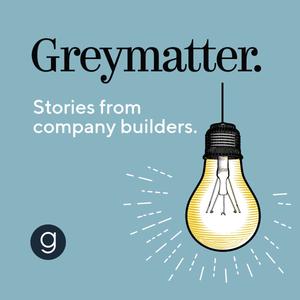 Greymatter
Greymatter
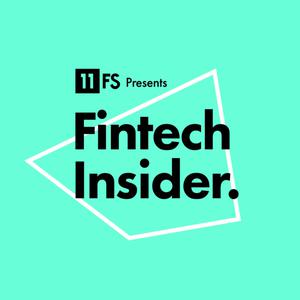 Fintech Insider Podcast by 11:FS
Fintech Insider Podcast by 11:FS
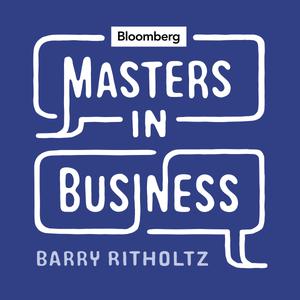 Masters in Business
Masters in Business
 a16z Podcast
a16z Podcast
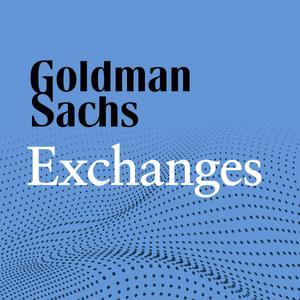 Goldman Sachs Exchanges
Goldman Sachs Exchanges